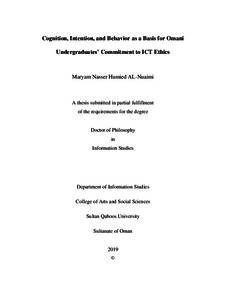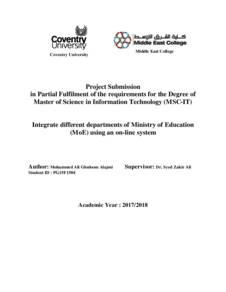Document
Cognition, intention, and behavior as a basis for Omani undergraduates commitment to ICT ethics
Publisher
Sultan Qaboos University
Gregorian
2019
Language
English
English abstract
The current study aimed to examine the relationships between information and communication technologies (ICT)-ethics-related cognition, ICT-ethics-related behavioral intentions and ICT-ethicsrelated behavior among undergraduates in the Sultanate of Oman. Additionally, the study sought to scrutinize the impact of demographic factors, including gender and academic major, sociopsychological, socio-cultural, and contextual factors on the ICT-ethics-related cognition, intentions, and behavior among undergraduates in the Sultanate of Oman. In addition, the study endeavored to explore the role of faculty and information systems centers in higher education institutions in instilling proper ICT-ethics-related cognition and intentions in undergraduates as well as in promoting proper ICT-ethics-related behavior among undergraduates in the Sultanate of Oman.
An explanatory sequential mixed methods research format was employed, with quantitative data as the primary dataset, and qualitative data as the secondary dataset. Therefore, cross-sectional ICT-ethics-related self-report survey scales were administered simultaneously to a random cluster sample of (N= 3,566) undergraduates, who were drawn from six universities in the Sultanate: Sultan Qaboos University (SQU), Nizwa University, Sohar University, Dhofar University, AL-Sharqyia University and AL-Buriami University College. Consequently, a convenient sample of (n=26) undergraduates from SQU participated in ten focus group discussion sessions, while (n=17) faculty from different colleges at SQU and (n=2) information systems professionals at SQU participated in the semi-structured interviews during the qualitative phase of the study. The results of the pilot study showed that the quantitative surveys under study possessed satisfactory degrees of construct validity, internal consistency reliability, and stability reliability.
The quantitative data were analyzed using structural equation modelling (SEM), the confirmatory factor analysis (CFA) approach, ne-way multivariate analysis of variance, two-way multivariate analysis of variance (MANOVA), and the multiple group analysis using the SEM technique. On the other hand, the study adopted the grounded theory approach to conduct the constant comparative thematic analysis for the purposes of the qualitative data analysis. The results of the descriptive analysis revealed moderate levels of ICT-ethics-related cognition and behavior among the participating undergraduates. However, the results of the SEM lent support to the basic hypotheses of the theory of planned behavior (TPB). Therefore, the intention was the most significant, strongest, and most immediate predictor of ICT-ethics-related behavior. In the meantime, the ICT-ethics-related intention mediated the effect of the ICT-ethics-related cognition on the ICT-ethics-related behavior, to the extent that the indirect effect of the ICT-ethics-related cognition on the ICT-ethics-related behavior through the effect of the ICT-ethics-related intention as a mediator was stronger than the direct effect of the ICT-ethics-related behavior. Moreover, the one-way MANOVA demonstrated that female undergraduates exhibited significantly higher ICT-ethics-related cognition and behavior than did their male counterparts. Subsequently, the results of qualitative data analysis showed the prevalent patterns of ICT-assisted deviance among undergraduates. Furthermore, the qualitative data analysis demonstrated that undergraduates accentuated an applied professional ethics approach towards realizing Floridi's ethical axioms of the macro-ethical onto-centric theory. Additionally, the participants in the qualitative phase discerned the different types of motives underlying ethical decision-making and diagnosed the etiology of ICT-assisted deviant behavior among undergraduates. Accordingly, several recommendations for practice and research were proposed to enhance ICT-ethicsrelated cognition and behavior among undergraduates.
Key words: ICT ethics, intellectual property, information privacy, PAPA, plagiarism, information security, grounded theory, Omani undergraduates.
Member of
Resource URL
Arabic abstract
تهدف الدراسة الحالية إلى دراسة العلاقة بين إدراك المبادئ الأخلاقية المتعلقة بتكنولوجيا المعلومات والاتصالات، والمقاصد السلوكية الأخلاقية المتعلقة بتكنولوجيا المعلومات والاتصالات والسلوك الأخلاقي المتعلق بتكنولوجيا المعلومات والاتصالات فيما بين الطلاب الجامعيين في سلطنة عمان. بالإضافة إلى ذلك، سعت الدراسة إلى تمحيص تأثير العوامل الديموغرافية، بما في ذلك الجنس والتخصص الأكاديمي، والعوامل الاجتماعية النفسية، والاجتماعية الثقافية، والسياقية فيما يتعلق بالإدراك والمقاصد والسلوكيات الأخلاقية المتعلقة بتكنولوجيا المعلومات والاتصالات فيما بين الطلاب الجامعيين في سلطنة عمان. بالإضافة إلى ذلك، سعت الدراسة إلى استكشاف دور الكليات ومراكز نظم المعلومات في مؤسسات التعليم العالي في ترسيخ الإدراك والمقاصد الأخلاقية المناسبة المتعلقة بتكنولوجيا المعلومات والاتصالات لدى الطلاب الجامعيين وكذلك في تعزيز السلوك الأخلاقي الملائم المتعلق بتكنولوجيا المعلومات والاتصالات فيما بين الطلاب الجامعيين في سلطنة عمان.
تم تطبيق أسلوب بحث توضيحي مدمج ومتسلسل، إلى جانب بيانات كمية كمجموعة بيانات أولية، وبيانات نوعية كمجموعة بيانات ثانوية. لذلك، جرى توزيع مقاييس استقصاء التقرير الذاتي المتعلقة بأخلاقيات تكنولوجيا المعلومات والاتصالات المقطعية في آن واحد إلى عينة عنقودية عشوائية من الطلاب الجامعيين (العدد = 3.566) الذين تم اختيارهم من 6 جامعات في السلطنة: جامعة السلطان قابوس، جامعة نزوى، جامعة صحار، جامعة ظفار، جامعة الشرقية وكلية البريمي الجامعية. ونتيجة لذلك، شاركت عينة ملائمة (العدد = 26) من طلاب جامعة السلطان قابوس في عشر جلسات نقاشية لمجموعة التركيز، في حين شارك (العدد = 17) من أعضاء هيئة التدريس من الكليات المختلفة في جامعة السلطان قابوس و(العدد = 2) من المتخصصين في نظم المعلومات في جامعة السلطان قابوس في مقابلات شبه منظمة خلال المرحلة النوعية من الدراسة. وأظهرت نتائج الدراسة الاستطلاعية أن المسوح الكمية قيد الدراسة تمتلك درجات مرضية من صدق البناء وموثوقية الاتساق الداخلي وموثوقية الاستقرار.
تم تطبيق أسلوب بحث توضيحي مدمج ومتسلسل، إلى جانب بيانات كمية كمجموعة بيانات أولية، وبيانات نوعية كمجموعة بيانات ثانوية. لذلك، جرى توزيع مقاييس استقصاء التقرير الذاتي المتعلقة بأخلاقيات تكنولوجيا المعلومات والاتصالات المقطعية في آن واحد إلى عينة عنقودية عشوائية من الطلاب الجامعيين (العدد = 3.566) الذين تم اختيارهم من 6 جامعات في السلطنة: جامعة السلطان قابوس، جامعة نزوى، جامعة صحار، جامعة ظفار، جامعة الشرقية وكلية البريمي الجامعية. ونتيجة لذلك، شاركت عينة ملائمة (العدد = 26) من طلاب جامعة السلطان قابوس في عشر جلسات نقاشية لمجموعة التركيز، في حين شارك (العدد = 17) من أعضاء هيئة التدريس من الكليات المختلفة في جامعة السلطان قابوس و(العدد = 2) من المتخصصين في نظم المعلومات في جامعة السلطان قابوس في مقابلات شبه منظمة خلال المرحلة النوعية من الدراسة. وأظهرت نتائج الدراسة الاستطلاعية أن المسوح الكمية قيد الدراسة تمتلك درجات مرضية من صدق البناء وموثوقية الاتساق الداخلي وموثوقية الاستقرار.
Category
Theses and Dissertations


